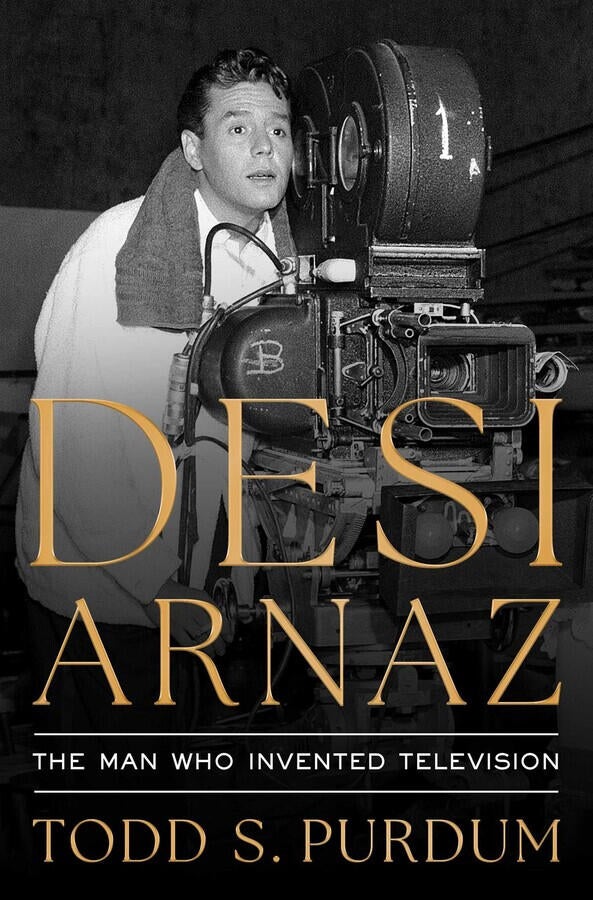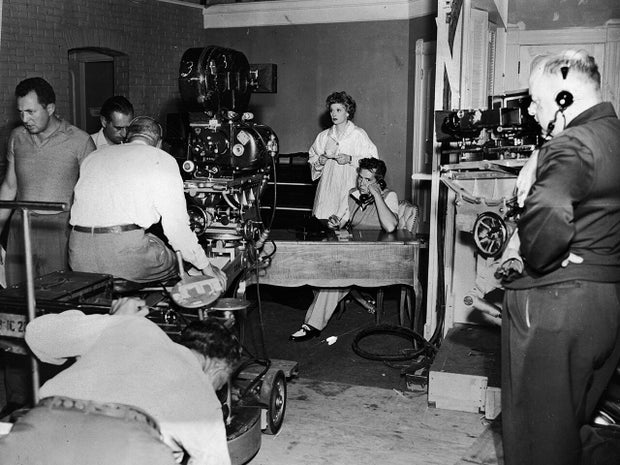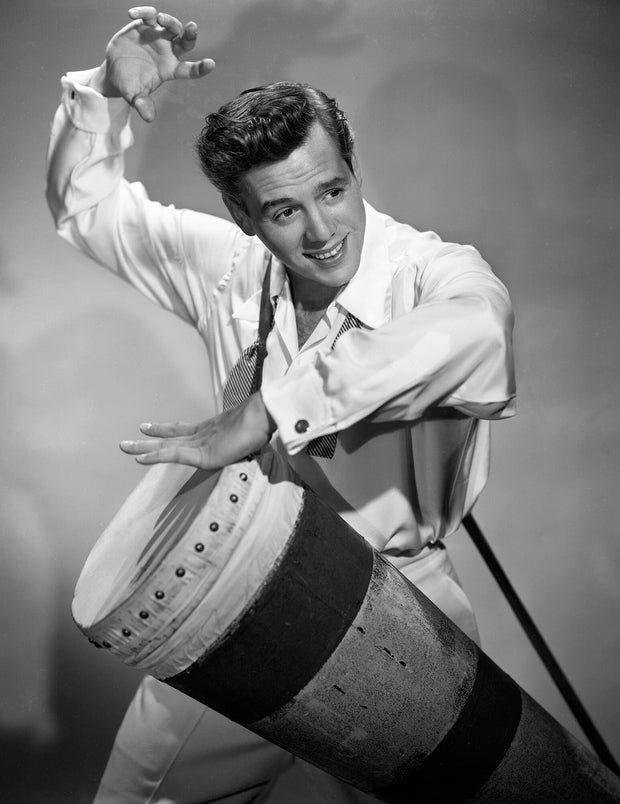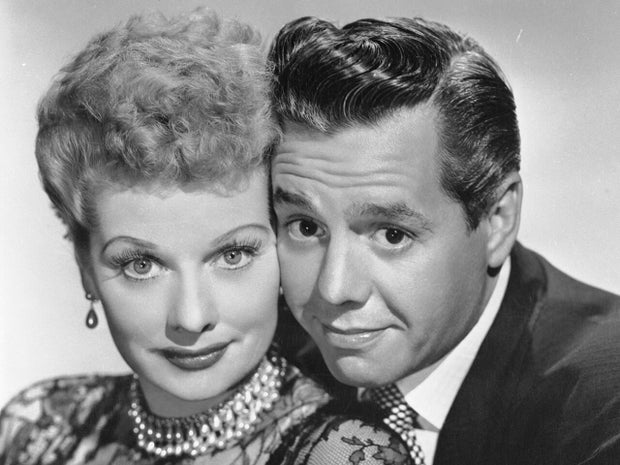Desi Arnaz: Singer, husband, dad, and the man who "invented" TV

In the fall of 1951, television audiences were introduced to a show biz-obsessed redhead and her bandleader husband, played by the real-life couple Lucille Ball and Desi Arnaz. While Lucy was undeniably the star on-camera, off-camera it was Desi, a refugee from Cuba with no connection to the world of entertainment, who would change the way television worked.
The most significant thing about Arnaz that people don't know, according to biographer Todd Purdum, is that he and his colleagues made the decision to film "I Love Lucy" on 35mm black-and-white film, "making possible its preservation, and essentially the invention of the rerun, and then syndication sales, and the whole modern way that television economics work."

One of the most striking revelations in Purdum's book, "Desi Arnaz: The Man Who Invented Television," is why the show was even created. "It was partly created to save their marriage," he said. "Desi was on the road, which enabled him to philander, and that bothered Lucy a great deal. She'd kind of reached the limits of her career in movies, and she'd gotten a radio show called 'My Favorite Husband,' in which she played a kind of a zany housewife, married to the fifth vice president of a bank. And CBS then said, 'We'd like this show to make the transition to television.' And Lucy said, 'Well, I only want to do a television show if Desi can be in it with me and play my husband.'"
CBS and sponsors were worried that audiences wouldn't accept them as a couple. (Never mind they'd been married for ten years.) Desi and Lucy also wanted to shoot the show in Los Angeles, where they'd laid down roots. Back then, New York City was the hub of television production.
"Everything was about the family," said daughter Lucie Arnaz, who was born just six weeks before her parents shot the first episode of "I Love Lucy." "It was always about, 'No, no, no. We have a plan. We wanna be together. We wanna be in California.' Which is crazy when you're nobody. He wasn't a big star. She was a decent star, you know, B pictures. And that they would put their foot down like that and say, 'Well, no, we don't wanna do that'? It's crazy!"
But Desi and Lucy were willing to gamble. CBS agreed to their terms only after the stars agreed to a pay cut. But in return, Arnaz demanded that the couple own the rights to the show. The gamble paid off: with the very first episode, America fell in love with Lucy and Desi.

Lucy was 39. The man born Desiderio Arnaz was 33, and a world away from his upbringing as an only child to a prominent family in Santiago, Cuba. His father had been mayor of the city; his mother, the daughter of a cofounder of Bacardi Rum. During the Cuban Revolution of 1933, the family lost everything. Teenaged Desi and his father fled to Miami, and lived in a rat-infested warehouse.
He referred to himself as a refugee, not an immigrant. "He was dislocated; he was not a voluntary arrival on our shores," said Purdum. "He came here as a result of tragedy, really. And I think he never got over that."
But he could play the guitar. Hired by bandleader Xavier Cugat, Desi introduced nightclub audiences to the Afro-Cuban conga, and what became his signature song, "Babalu."

In 1940, Arnaz jumped to the big screen in "Too Many Girls," where he met his match in co-star Lucille Ball. The two married six months later.
"I Love Lucy" would make the couple very rich. It was Desi's idea to buy RKO Studios, which he and Lucy renamed Desilu, which became a television producing juggernaut, with more sound stages than MGM, 20th Century Fox or Warner Brothers. "That was their peak," said Purdum. "And then, it went downhill from there because of Desi's drinking, really."
But drinking wasn't his only addiction. "People say he had affairs," said Lucie. "He never had an affair. He didn't even know these dames' names, you know? They were hookers.

"He loved my mother. He loved his family. It was a very unique, weird problem to have, and I think that's the reason she stayed with him so long, is that she understood it. I don't think I could do what she did. But somehow at the time, with what they had, with what they needed from each other, they stuck it out as long as they could."
In 1960, when Lucie Arnaz was eight and her brother, Desi Jr., was seven, America's most famous couple announced the end of their show – and their marriage.
"We were at their house in Palm Springs," Lucie recalled. "And they said that, 'We love each other, but the being-husband-and-wife part is broken. And we can't live together anymore.' And I remember that my brother said, 'But if it's broken, can't you just fix it? Can't you put stuff on it and fix it?' And they said, 'I don't think so.'
"The truth of it is, Mo, they were happier after they got divorced. The screaming and the arguing and all that stuff stopped," Lucie said.
I asked, "And when you were told, did you sort of instinctively become protective of your little brother?"
"I wish you'd been my therapist growing up, Mo!" Lucie laughed. "I think mostly I sort of was very protective of my dad, believe it or not. I felt really sorry for my dad."
Why? "I don't know. I think because I felt like he was the one that got ousted. We were still in the house. And I felt like he got a lotta the blame. Even though I was too young to understand what it was all about, I knew that he had problems. I knew that he would, you know, drink sometimes. But that really became worse when I was older, when I was, like, a teenager. But I just felt bad for him."
Both Ball and Arnaz remarried, he to family friend Edith Hirsch. Lucy went on to star in several TV shows. Desi produced the series "The Mothers-in-Law," wrote an autobiography, and eventually got sober with the help of his son, himself a recovered drug abuser.
"It was fantastic," said Lucie. "It, like, my greatest memory of him to this day, to have him, the guy who said, 'I don't air my dirty laundry in front of other people,' and then when he finally made his decision after his wife, Edie, darling, wonderful Edie died, he said, 'I can't do this anymore.' And he got up and said, 'My name is Desi and I'm an alcoholic.' And that's my proudest moment, that he stood up next to me and I watched him do that, to take responsibility and to try to solve it."
Less than a year later, Arnaz was diagnosed with lung cancer. "My mother came down to visit my dad in Del Mar when he was sick," said Lucie. "And I ran and got as many VHS tapes as I could find, and they did sit there for a couple hours and look at old 'I Love Lucy' shows and laugh and remember."
On November 30, 1986, what would've been their wedding anniversary, Desi and Lucy spoke for a final time.
"He was very, very sick," said Lucie. "And I said, 'I'm gonna put him on the phone now, so say what you wanna say.' And I just held the phone to his ear. And all I could hear her saying was, 'I love you,' like, five times in a row. And he listened and he said, 'I love you too, honey.' And then he said, 'Good luck with your shows.'"
Two days later, Desi Arnaz died at 69.
We end with the man himself, during a 1954 tribute hosted by Ed Sullivan, reflecting on his extraordinary journey: "We came to this country and we didn't have a cent in our pockets. From cleaning canary cages to this night here in New York, it's a long ways. And I don't think there's any other country in the world that would give you that opportunity. I want to say, 'Thank you, thank you, America.'"
READ AN EXCERPT: "Desi Arnaz: The Man Who Invented Television" by Todd S. Purdum
For more info:
Story produced by Kay Lim. Editor: Joseph Frandino.
See also:
- We still love Lucy ("Sunday Morning")
Mo Rocca is an award-winning correspondent for "CBS News Sunday Morning," where he reports on a wide range of topics. Rocca is also the host and creator of the hit podcast "Mobituaries," and the host of the CBS Saturday morning series "The Henry Ford's Innovation Nation."
Cbs News




